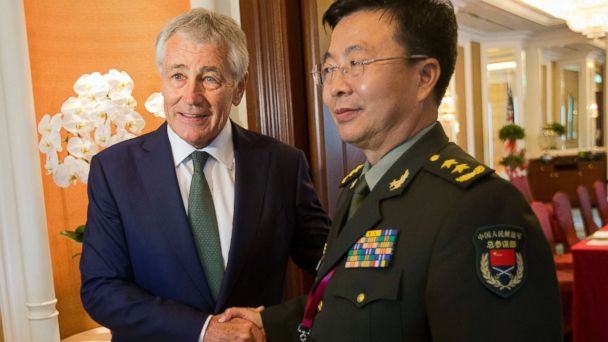Hagel Dishes Out China Criticism, Gets It Right Back From Chinese

U.S. Defense Secretary Chuck Hagel, left, meets with Lt. Gen. Wang Guanzhong, right, China's deputy chief of General Staff, Saturday, May 31, 2014 in Singapore.
In an unusual move for a high-level meeting between military leaders, Secretary of Defense Chuck Hagel got an earful from a Chinese military official who condemned Hagel's earlier comments Saturday in which he criticized China's aggressive behavior towards its neighbors.
"You were very candid this morning and, to be frank, more than our expectation," Chinese Deputy Chief of the General Staff Wang Guanzhong told Hagel during a 30 minute meeting that China had requested.
"I think this morning you, in your speech, have made quite full comments on your view or rather your criticism of China this morning. Although I do think that those criticisms are groundless, I do appreciate your candor," Wang continued.
Those criticisms Wang referred to included Hagel's mention of China's flare-ups with Vietnam and the Philippines over disputed territories in the South China Sea, as well as its establishment of an Air Defense Identification Zone (ADIZ) in the East China Sea, which includes islands that both China and Japan claim as their own.
"In recent months, China has undertaken destabilizing, unilateral actions asserting its claims in the South China Sea. It has restricted access to Scarborough Reef; put pressure on the long-standing Philippine presence at the Second Thomas Shoal; begun land reclamation activities at multiple locations; and, moved an oil rig into disputed waters near the Paracel Islands," Hagel said during his address to the Shangri-La Dialogue, the purpose of his Singapore visit.
A senior Defense official said that the Chinese delegation's tone became amicable as soon as Wang finished his public remarks.
"I was a bit surprised by that," the official said, adding that the conversation ranged from U.S.-China military-to-military cooperation to the trade relationship between the two countries.
"Sometimes the way these meetings work, there is a difference between what is said in private and what is said in public," the official added, noting that the topics discussed in the meeting dictated the tone. For example, the contentious issue of cyber espionage did not come up.
Hagel's speech also did not go over well with Chinese members of the audience as he delivered it.
During a question-and-answer session after the speech, Chinese Major General Yao Yunzhu took Hagel to task over his criticism of the East China Sea identification zone. Hagel had urged China to abide by international law and norms, which he said it didn't do when it suddenly declared the disputed islands, known in Chinese as Diaoyu and Japanese as Senkaku, as part of its air defense map.
Yao asked him rhetorically which international laws the United States consulted when establishing its own ADIZ.
"What international organization has the U.S. asked for permission or what country has the U.S. come to before they set up their ADIZ? So what international role has China violated in setting up an ADIZ in the East China Sea?" she asked.
"When the United States announced its ADIZ, as other nations always do, they consult with neighbors. It's not unilateral. It's a relationship that they work through in order to come to an arrangement," Hagel responded.
Later during the meeting with the Chinese delegation, Wang noted that both he and Hagel had both been active members of their nations' militaries.
"I do think it's much a better way for soldiers to talk with peer soldiers and we are all very candid," he said.
But the press traveling with Hagel was spirited out of the meeting room before Hagel responded.
And underscoring leaders' tendency to say different things in public and private, Wang did an interview with China's CCTV right after the meeting, in which he reverted back to his critical tone.
"It was a speech filled with instigation, threat and intimidation, which wanted to incite the destabilizing factors of Asia-Pacific region to stir up disputes," he said.